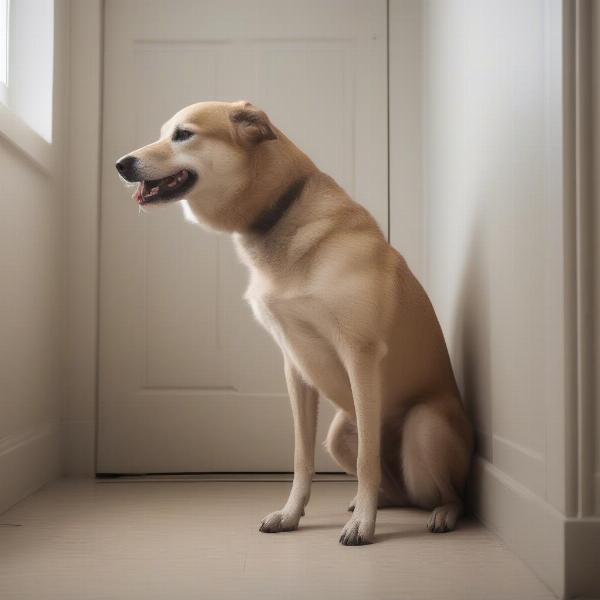Does your dog suddenly growl at seemingly empty corners of the room at night? This can be unsettling, leaving you wondering what’s causing this behavior. Understanding why your dog is growling at nothing at night requires considering a range of potential factors, from underlying medical conditions to environmental triggers and even just plain old canine quirks. This article will explore these reasons, helping you decipher your dog’s nocturnal growls and ensure your furry friend’s well-being.
Potential Reasons for Nighttime Growling
Several factors can contribute to a dog growling at nothing at night. Let’s delve into some of the most common causes:
-
Cognitive Decline: As dogs age, they can experience cognitive decline, similar to dementia in humans. This can lead to confusion, anxiety, and changes in behavior, including growling at seemingly nothing, especially at night.
 Dog exhibiting signs of cognitive decline, growling at night
Dog exhibiting signs of cognitive decline, growling at night -
Hearing and Vision Changes: Reduced hearing or vision, common in older dogs, can make them more sensitive to subtle noises or movements that we might not perceive. They may growl in response to these stimuli, even if they appear to be “nothing” to us. This is particularly true at night when shadows and sounds can be more pronounced.
-
Anxiety and Stress: Just like humans, dogs can experience anxiety and stress. Changes in routine, loud noises, or even a new piece of furniture can trigger anxious behaviors, including nighttime growling.
-
Territorial Behavior: Some dogs are naturally more territorial than others. They might growl at perceived threats, even if those threats are not visible to us. At night, with reduced visibility, this behavior can be amplified.
-
Medical Conditions: Certain medical conditions, such as pain or neurological issues, can also cause changes in behavior, including growling. If your dog’s growling is a new or sudden development, it’s crucial to consult a veterinarian to rule out any underlying medical problems.
Addressing Your Dog’s Nighttime Growling
Once you have identified the potential cause, you can take steps to address the issue:
-
Veterinary Check-up: If you suspect a medical reason, a visit to the vet is the first step. They can diagnose any underlying conditions and recommend appropriate treatment.
-
Creating a Safe and Comfortable Environment: Ensure your dog has a safe and comfortable space to retreat to, especially at night. A cozy bed in a quiet corner can help reduce anxiety and promote relaxation.
-
Behavioral Training: If the growling is due to anxiety or territorial behavior, consider consulting a certified dog trainer. They can help you implement behavior modification techniques to address the issue. My dog howls in his sleep and growls as well.
-
Enrichment and Exercise: Providing your dog with plenty of physical and mental stimulation during the day can help tire them out and reduce anxiety at night.
Understanding Your Dog’s Language
Remember, growling is a form of communication for dogs. It’s their way of expressing discomfort, fear, or warning of a perceived threat. Instead of punishing the growling, try to understand the underlying cause and address it appropriately. If your dog is territorial at night, read about dog barking nuisance to learn more. For similar situations, refer to why does my dog growl at me at night.
Conclusion
While a growling dog at night can be concerning, it’s often a sign that something is bothering them. By carefully observing your dog’s behavior, consulting with professionals, and creating a supportive environment, you can help your furry friend feel safe and secure, reducing or eliminating those mysterious nighttime growls. If the growling is accompanied by other vocalizations, check why is my dog growling at nothing. For similar issues like howling during sleep, visit my dog howls in his sleep for guidance.
FAQ
- Is it normal for dogs to growl at night? While occasional growling isn’t unusual, persistent nighttime growling can indicate underlying issues.
- Should I punish my dog for growling? Never punish a dog for growling. It’s a form of communication, and punishing it can worsen the underlying problem.
- Can anxiety cause a dog to growl at nothing? Yes, anxiety is a common cause of seemingly unexplained growling.
- What should I do if my dog suddenly starts growling at night? Consult your veterinarian to rule out medical causes and consider seeking advice from a certified dog trainer.
- How can I create a safe space for my dog at night? Provide a comfortable bed in a quiet area where your dog can feel secure.
- What if my dog’s growling doesn’t stop? If the growling persists despite your efforts, seek professional help from a veterinarian or a certified animal behaviorist.
- Could my dog be growling due to pain? Yes, pain can manifest as behavioral changes, including growling. A veterinary check-up is recommended.
Related Articles
why does dog howl in his sleep
About ILM Dog
ILM Dog is your one-stop resource for expert advice on dog breeds, health, training, nutrition, grooming, and much more. We’re passionate about providing dog owners worldwide with the information they need to provide the best possible care for their canine companions. Whether you’re a seasoned dog owner or just starting your journey, ILM Dog offers practical tips and insights to help you navigate every aspect of dog ownership. For personalized advice or to learn more about our services, contact us at [email protected] or call us at +44 20-3965-8624.